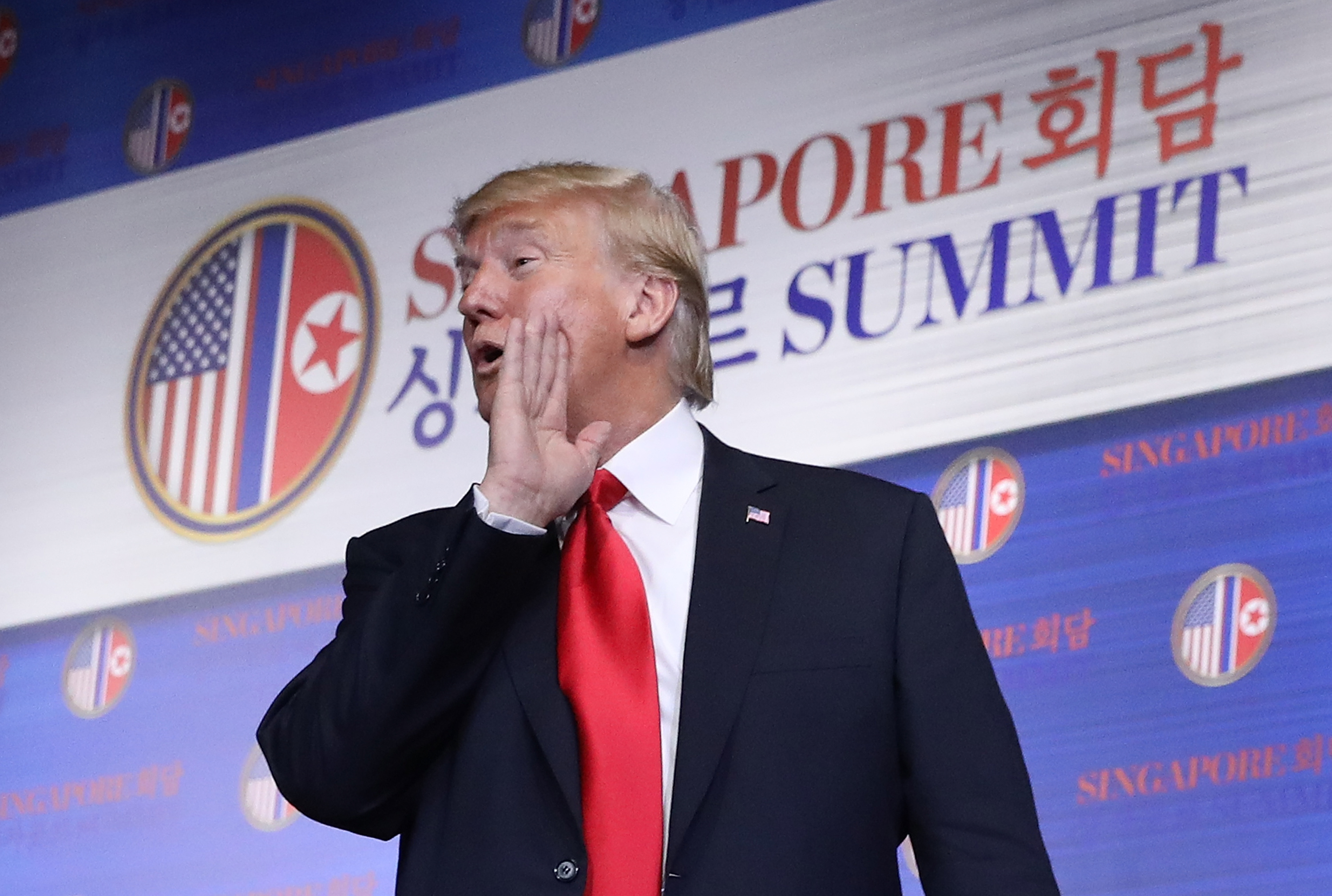Trump is trying to use the Pyongyang playbook on Iran
Will it work?


President Trump got elected by promising to disrupt the status quo. Nowhere has this been more true than on foreign policy. From praising Russian strongman Vladimir Putin to issuing harsh critiques of NATO allies and engaging with North Korean leader Kim Jong Un, the president has certainly provided disruption.
This week, Trump took aim at Iran, seemingly hoping to use the same tough talk he spouted at North Korea on Iranian President Hassan Rouhani. But North Korea and Iran are not the same, and while threatening one may have worked in Trump's favor, it's unlikely to work on the other.
On Sunday, Iranian state media reported remarks from Rouhani in which he warned America about the consequences of crossing the Iranians. "America should know that peace with Iran is the mother of all peace," Rouhani told a conference of Iranian diplomats, "and war with Iran is the mother of all wars." Rouhani's commentary likely referred to Trump's decision to renounce the unsigned executive agreement reached by the Obama administration, the Joint Comprehensive Plan of Action (JCPOA), which ostensibly delayed Iranian development of nuclear weapons by 10 years.
The Week
Escape your echo chamber. Get the facts behind the news, plus analysis from multiple perspectives.

Sign up for The Week's Free Newsletters
From our morning news briefing to a weekly Good News Newsletter, get the best of The Week delivered directly to your inbox.
From our morning news briefing to a weekly Good News Newsletter, get the best of The Week delivered directly to your inbox.
The Iranian regime is known for its threats and provocative statements about the U.S. For nearly 40 years, the regime has regularly proclaimed its policy as "Death to America," sometimes repackaged as "Death to the Great Satan!" The previous president once mused publicly that "a world without America is not only desirable, it is achievable," and that Israel should be "wiped off the map," just in case anyone was confused by these constant declarations. In that context, Rouhani's barely veiled threat was only mildly remarkable.
Trump's response, on the other hand, was singular — at least for a sitting president. Tweeting in all caps, Trump warned Rouhani to "BE CAUTIOUS!"
It didn't take long to get a reaction from the Iranians, who at first called Trump's comment a "passive response" to Rouhani. Later on Monday, Iran Foreign Minister Javad Zarif tweeted, "COLOR US UNIMPRESSED." Zarif claimed that Iran had heard worse "a few months ago" and over the 40-year course of the nation since the revolution that brought Ayatollah Ruhollah Khomeini to power. Zarif offered Trump his own advice in return to "BE CAUTIOUS!"
"Cautious" is not Trump's normal operating policy. Trump came to Washington promising to set a different tone, pledging to offer belligerency as a response to belligerents like Iran. His recent experience in turning the tables on North Korea may show what he has in mind with his sudden and remarkable response to Rouhani.
A free daily email with the biggest news stories of the day – and the best features from TheWeek.com
When Trump took office, North Korean Leader Kim Jong Un had spent the first years of his ascendance to dictator ramping up both rhetoric and action against the U.S. Despite several good-faith efforts by former President Barack Obama, which followed years of carrot-and-stick approaches from former President George W. Bush with Kim's father, the regime in Pyongyang only grew more emboldened. By late last year, North Korea successfully detonated a hydrogen-based nuclear weapon and demonstrated that its ICBMs could reach far into the American mainland.
Rather than pursue a calming diplomacy, though, Trump ramped up both personal attacks and martial rhetoric. He ridiculed Kim as "little Rocket Man" and constantly reminded the dictator that the U.S. had a lot more than just a few missiles and nuclear weapons. Trump threatened to conduct a devastating war of annihilation if Kim launched any attacks, language that definitely caught the attention of China.
That talk-tough strategy appeared to work. This spring, North Korea's decision to pursue a policy of engagement took most observers by surprise. Kim unilaterally suspended missile and nuclear-weapons testing and Trump suspended joint military drills, leading to the first-ever meeting between U.S. and North Korean heads of state.
Trump seems to think a similar strategy will work on Tehran. However, it's not yet clear that it's actually worked on Pyongyang. Despite having made promises during the run-up to the Singapore summit on denuclearization, North Korea now says it wants a peace treaty first as a precondition to ensure the security of the Kim regime. That won't fly at all, as the Trump administration has made clear that normalization can only come at the end of denuclearization and the elimination of the threat Pyongyang poses to the region. North Korean negotiators have stopped showing up for scheduled talks at times, and it appears earlier promises from Kim that missile facilities had been dismantled might not have been true at all.
Furthermore, the mullahs in Tehran are in a much different position than the Kim regime. North Korea is getting choked by global sanctions that have finally started to bite; the economy contracted more in 2017 than anytime in the past 20 years, and the nation is enduring chronic famine. In contrast, the Iranians are far better off. Most countries dropped sanctions after the JCPOA went into effect in 2015, allowing Iran to export oil again and gain hard currency. While the government faces serious unrest over economic conditions, there isn't widespread famine within Iran.
Finally, there is another key difference between the two nations that might influence whether high-pressure tactics can work. The Kim regime is brutal and erratic, but has one primary rational goal: survival. The Shi'ite extremists in charge of Iran at least publicly subscribe to an apocalyptic vision about a 12th Imam of Islam, whose return is the purpose of their theocratic regime and which will only happen after a great conflict. This non-rational purpose doesn't prioritize survival, although it's tough to say in practice just where those priorities actually lie with Ayatollah Ali Khamenei and his regime. Iran might choose war over negotiation on the basis of theocratic supremacy for several reasons, which makes a mutually assured destruction strategy more of a gamble.
Still, the relations between the U.S. and Iran have been stagnating in open hostility for 40 years. The JCPOA didn't change that, nor did it change Iran's orientation as the biggest state sponsor of terrorism in the region and possibly the world. It's a status ripe for disruption, as long as the U.S. and its allies can prepare for all of the possible consequences. At least we have consensus on a guiding principle: BE CAUTIOUS.
Edward Morrissey has been writing about politics since 2003 in his blog, Captain's Quarters, and now writes for HotAir.com. His columns have appeared in the Washington Post, the New York Post, The New York Sun, the Washington Times, and other newspapers. Morrissey has a daily Internet talk show on politics and culture at Hot Air. Since 2004, Morrissey has had a weekend talk radio show in the Minneapolis/St. Paul area and often fills in as a guest on Salem Radio Network's nationally-syndicated shows. He lives in the Twin Cities area of Minnesota with his wife, son and daughter-in-law, and his two granddaughters. Morrissey's new book, GOING RED, will be published by Crown Forum on April 5, 2016.
-
 Breaking news: the rise of ‘smash hit’ rage rooms
Breaking news: the rise of ‘smash hit’ rage roomsUnder the Radar Paying to vent your anger on furniture is all the rage but experts are sceptical
-
 Did markets’ ‘Sell America’ trade force Trump to TACO on Greenland?
Did markets’ ‘Sell America’ trade force Trump to TACO on Greenland?Today’s Big Question Investors navigate a suddenly uncertain global economy
-
 ‘We know how to make our educational system world-class again’
‘We know how to make our educational system world-class again’Instant Opinion Opinion, comment and editorials of the day
-
 The billionaires’ wealth tax: a catastrophe for California?
The billionaires’ wealth tax: a catastrophe for California?Talking Point Peter Thiel and Larry Page preparing to change state residency
-
 Bari Weiss’ ‘60 Minutes’ scandal is about more than one report
Bari Weiss’ ‘60 Minutes’ scandal is about more than one reportIN THE SPOTLIGHT By blocking an approved segment on a controversial prison holding US deportees in El Salvador, the editor-in-chief of CBS News has become the main story
-
 Has Zohran Mamdani shown the Democrats how to win again?
Has Zohran Mamdani shown the Democrats how to win again?Today’s Big Question New York City mayoral election touted as victory for left-wing populists but moderate centrist wins elsewhere present more complex path for Democratic Party
-
 Millions turn out for anti-Trump ‘No Kings’ rallies
Millions turn out for anti-Trump ‘No Kings’ ralliesSpeed Read An estimated 7 million people participated, 2 million more than at the first ‘No Kings’ protest in June
-
 Ghislaine Maxwell: angling for a Trump pardon
Ghislaine Maxwell: angling for a Trump pardonTalking Point Convicted sex trafficker's testimony could shed new light on president's links to Jeffrey Epstein
-
 The last words and final moments of 40 presidents
The last words and final moments of 40 presidentsThe Explainer Some are eloquent quotes worthy of the holders of the highest office in the nation, and others... aren't
-
 The JFK files: the truth at last?
The JFK files: the truth at last?In The Spotlight More than 64,000 previously classified documents relating the 1963 assassination of John F. Kennedy have been released by the Trump administration
-
 'Seriously, not literally': how should the world take Donald Trump?
'Seriously, not literally': how should the world take Donald Trump?Today's big question White House rhetoric and reality look likely to become increasingly blurred
